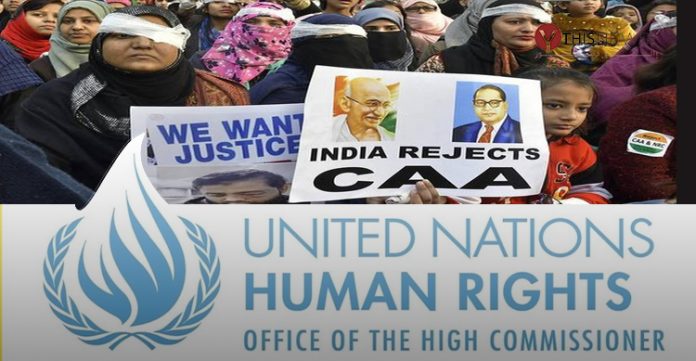Geneva: The world is taking notice of the actions of India. This is proved by UN’s request to India for releasing charges from the people who protested against the citizen amendment law.
On Friday, UN experts urged the government of India to immediately set free the innocents who had protested with their basic human rights regarding the highly debated new citizenship law of India.
“These defenders, many of them students, appear to have been arrested simply because they exercised their right to denounce and protest against the CAA (Citizenship Amendment Act), and their arrest seems clearly designed to send a chilling message to India’s vibrant civil society that criticism of government policies will not be tolerated,” the experts said.
Safoora Zargar’s case was widely spread and known by people. The pregnant woman, a student of a Delhi University was arrested for partaking in the rallies and protests against the Indian government’s new citizenship law. Criticizing and concerned over their citizenship getting robbed, people had taken to the streets to raise awareness and urge the government to scrap the bill.
Accused of going against the government, Safoora was jailed for over two months and was allegedly kept in a solitary confined condition. She wasn’t allowed a prisoner’s basic rights as well as they denied her permission to contact her family and advocates, including absence of any medical care and diet, given her sensitive condition.
At last, she was granted bail based on humanitarian grounds on the 23rd of June, 2020, in her sixth month of pregnancy.
The CAA offers quick and simplified access to citizenship for people belonging to specific religious minorities from several neighbouring countries. However, it excludes Muslims. December 2019 saw massive number of protests from all over the country by Indians who stood up citing the secular policies of the Indian constitution. People of every age group and diverse religions, including Hinduism, came forward to protest against the violation of the foundation of the constitution of India due to the adoption of CAA.
Cases filed in this regard speak about the violations and denial to use humans rights and other serious allegations. Many of them are related to due process failings during the arrest and detention. They also include allegations of torture and ill-treatment during the protests and in prison.
The 11 individual cases against the police are filed by MeeranHaider, Gulfisha Fatima, SafooraZargar, Asif Iqbal Tanha, DevanganaKalita, Natasha Narwal, Khalid Saifi, Shifa Ur Rehman, Dr. Kafeel Khan, Sharjeel Imam, AkhilGogoi.
“Authorities should immediately release all human rights defenders who are currently being held in pre-trial detention without sufficient evidence, often simply on the basis of speeches they made criticising the discriminatory nature of the CAA,” they said.
The experts raised concerns that the Indian authorities’ reaction to the protests seemed biased. It appears they have not similarly investigated allegations of incitement to hatred and violence made by CAA supporters, some of whom are reported to have chanted “shoot the traitors” at counter-rallies termed ‘Pro-CAA’.
The UN experts further highlighted their dismay over the fact that the Indian officials were resorting to methods which did not seem to be peaceful. They said that the Indian authorities invoked counter-terrorism or national security legislation and used political and police power to put innocents in jail. Moreover, they refused to grant bail to the protesters and booked them under heavy charges and sentences of the Indian law.
“Although demonstrations ended in March due to the COVID-19 pandemic, and India’s Supreme Court issued a recent order to decongest jails because of health concerns related to the pandemic, protest leaders continue to be detained. The reported spread of the virus in Indian prisons makes their immediate release all the more urgent,” the experts said.
The UN is presently in talks with the Indian government to solve the issue and persuade them to release the protesters as they were only using their human rights during the protests.


